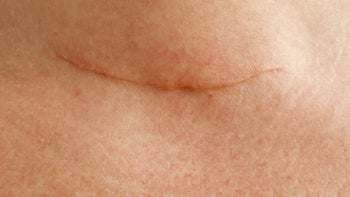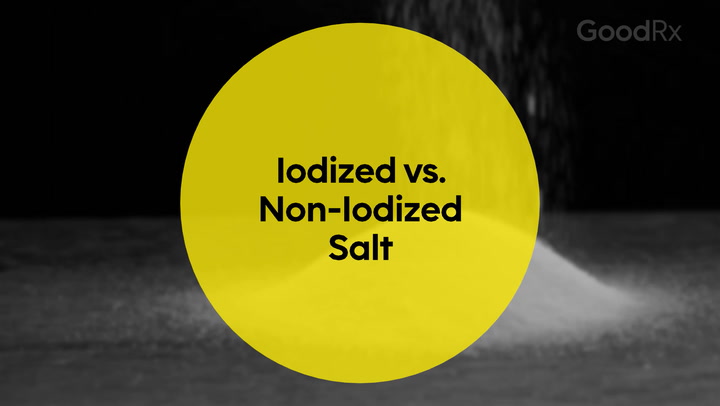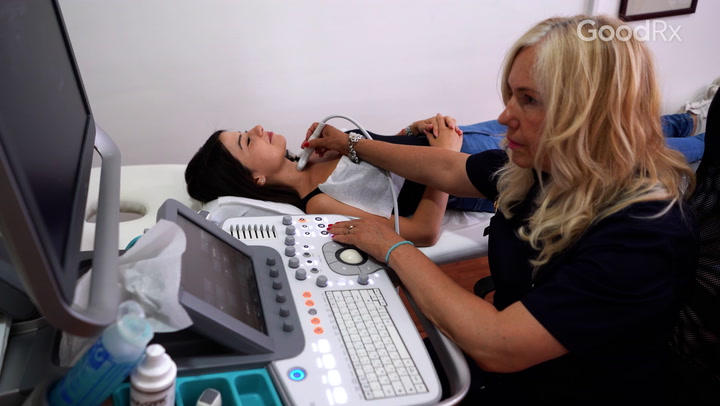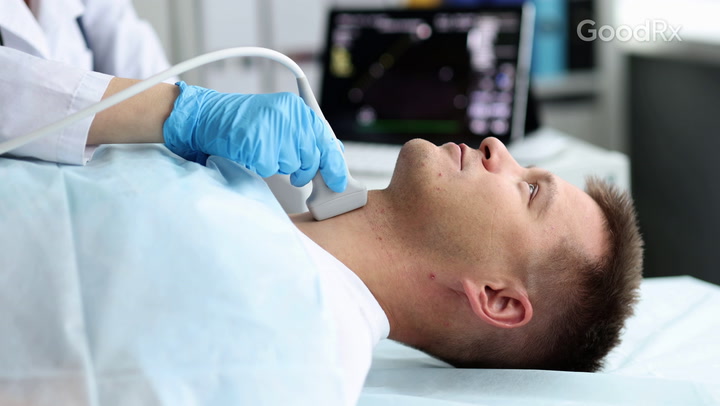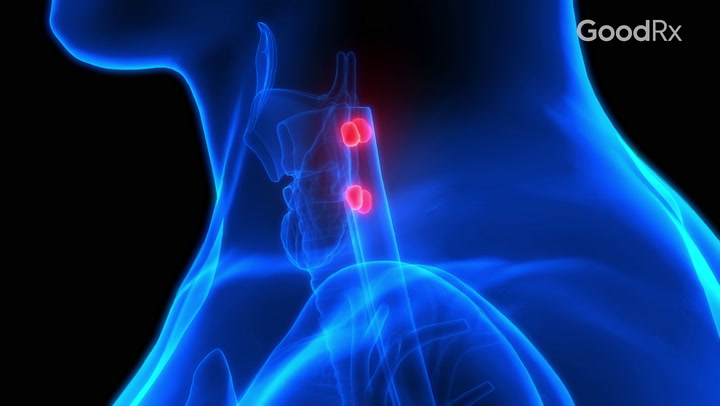GoodRx Guide
Thyroid Disorders: Your GoodRx Guide
Definition
The thyroid gland is commonly described as a “butterfly-shaped” gland in the front of the neck. It releases hormones that are important for many body functions. A healthy thyroid gland helps control your metabolism, body temperature, growth, and development.
Certain conditions can threaten the health of your thyroid. These thyroid disorders can affect the structure or function of the thyroid gland. The two most common thyroid disorders are: hypothyroidism (underactive thyroid) and hyperthyroidism (overactive thyroid). Other thyroid disorders include:
Goiter (enlarged thyroid)
Thyroid nodules (growths in the thyroid)
Thyroiditis (inflammation of the thyroid)
Causes
There are many different factors that can lead to thyroid disorders. These will often depend on the specific thyroid condition. The most common cause for thyroid disease is an overactive immune system.
Hypothyroidism is commonly caused by Hashimoto’s thyroiditis. This is an autoimmune reaction that keeps the thyroid gland from making enough thyroid hormone. Hyperthyroidism is most often due to Graves’ disease — an autoimmune condition that causes the body to make too much thyroid hormone.
Other risk factors for thyroid disease can include:
Older age
Iodine deficiency
Smoking
Viral or bacterial infections
Pregnancy
Stress
Radiation exposure
Medications
Symptoms
Symptoms of a thyroid disorder will differ based on the cause. Let’s take a closer look at how the symptoms vary by condition.
Goiter symptoms will depend on how big the goiter has grown. These symptoms include:
Swelling of the neck
Choking sensation
Shortness of breath
Hoarseness
Thyroid nodules often have no symptoms, especially if they aren’t very large. Sometimes nodules can affect the function of the thyroid and cause symptoms like:
Hoarse voice
Difficulty breathing
Trouble swallowing
Hypothyroidism symptoms vary from person to person. For some, you may not notice any symptoms at all. Hypothyroidism symptoms can include:
Fatigue
Weight gain
Depression
Constipation
Brittle hair, skin, or nails
Feeling cold
Irregular periods
Hyperthyroidism can cause the body to go into overdrive. Symptoms of hyperthyroidism include:
Feeling nervous or shaky
Tremors
Diarrhea
Weight loss
Feeling hot and flushed
Trouble sleeping
Fast or irregular heartbeat
Thyroiditis happens when the thyroid gets inflamed. This can happen for a number of reasons, like after pregnancy (postpartum thyroiditis) or due to autoimmune causes (autoimmune thyroiditis). Symptoms of thyroiditis may have features of hypothyroidism or hyperthyroidism. It may also be associated with a painful goiter or sore throat.
Thyroid cancer often has no symptoms at all in the early stages. In advanced stages, symptoms are more likely to be due to a growing goiter or nodule.
Related Health Conditions
Diagnosis
There are many different ways to diagnose thyroid disorders. Along with your symptoms, a healthcare provider can make the diagnosis using:
Physical exam
Blood tests (like TSH, T4, T3 or thyroid antibody tests)
Ultrasound
Thyroid biopsy
Treatments
Treatment for thyroid disorders will vary based on the condition. Medical providers may just choose to monitor your condition over time and not offer any treatment. Some thyroid conditions can even resolve on their own with no treatment needed at all — like postpartum thyroiditis.
Other thyroid disorders can be treated in many different ways including:
Thyroid hormone replacement (like levothyroxine)
Antithyroid medication (like methimazole)
Radioactive iodine
Radiation
Chemotherapy
Your healthcare provider will suggest a treatment plan that’s best for you based on your thyroid condition and medical history.
Frequently asked questions about thyroid disorders
Hypothyroidism is the most common thyroid disorder. About 5% of people have a known diagnosis of hypothyroidism. But it’s estimated that another 5% of people have an underactive thyroid and don’t even know it. Talk with your healthcare provider about your risk for hypothyroidism and your need for screening.
Untreated hypothyroidism can lead to serious complications. These can include physical and mental health effects. Common complications include:
Depression
Dementia
Heart disease
Infertility
Goiter
In rare cases, untreated hypothyroidism can lead to coma or death.
There are some reversible causes of hypothyroidism. But, most people with hypothyroidism will have to take lifelong medications to treat it. Your healthcare provider can discuss if a cure should be one of your treatment goals based on the cause of your hypothyroidism. Remember, you should never stop taking your thyroid medication without talking with your healthcare provider first.
References
American Thyroid Association. (n.d.). Q and A: Can thyroid disease be cured?
American Thyroid Association. (n.d.). Thyroiditis.
Can, A. S., et al. (2023). Goiter. StatPearls.
Chiovato, L., et al. (2019). Hypothyroidism in context: Where we’ve been and where we’re going. Advances in Therapy.
Endocrine Society. (2022). Thyroid nodules.
Franco, J.S., et al. (2013). Chapter 30 Thyroid disease and autoimmune diseases. Autoimmunity: From Bench to Bedside.
Kyritsi, E. M., et al. (2020). Autoimmune thyroid disease in specific genetic syndromes in childhood and adolescence. Frontiers in Endocrinology.
MedlinePlus. (2021). Hyperthyroidism.
MedlinePlus. (2023). Thyroid diseases.
National Cancer Institute. (2023). Thyroid cancer treatment (PDQ) – Patient version.
Quintero, B. M., et al. (2021). Thyroiditis: Evaluation and treatment. American Family Physician.
Wiersinga, W. M. (2014). Adult hypothyroidism. Endotext.









